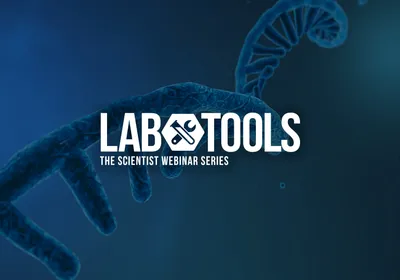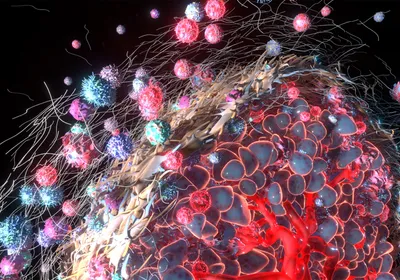 In acute lymphoblastic leukemia, immature white blood cells -- stained purple here -- proliferate in the marrow, crowding out normal cells and spreading to other organs. It's fatal in a few weeks without treatment.IMAGE: WIKIMEDIA COMMONS, USER VASHIDONSKyrosine kinase inhibitors (TKIs) quell unregulated cell growth and are commonly used to treat cancer, but many tumors develop resistance to the therapy. New research published today in Nature identifies a pathway that keeps the cancer cells alive long enough to evolve such resistance, and shows that inhibiting this pathway in mice with acute lymphoblastic leukemia (ALL) can prevent treatment evasion and cancer reemergence.
In acute lymphoblastic leukemia, immature white blood cells -- stained purple here -- proliferate in the marrow, crowding out normal cells and spreading to other organs. It's fatal in a few weeks without treatment.IMAGE: WIKIMEDIA COMMONS, USER VASHIDONSKyrosine kinase inhibitors (TKIs) quell unregulated cell growth and are commonly used to treat cancer, but many tumors develop resistance to the therapy. New research published today in Nature identifies a pathway that keeps the cancer cells alive long enough to evolve such resistance, and shows that inhibiting this pathway in mice with acute lymphoblastic leukemia (ALL) can prevent treatment evasion and cancer reemergence.
"This is a very important article showing a novel mechanism for ALL resistance to TKI therapy," leukemia immunologist Meir Wetzler of the Roswell Park Cancer Institute, who was not involved in the research, wrote in an email to The Scientist. "It holds promise for novel treatment approaches in patients."
Many cancers -- leukemia, breast, lung, malignant melanoma, to name a few -- contain mutations in tyrosine kinase enzymes that result in unregulated cell growth. A major breakthrough in cancer treatment was the development of Imatinib, marketed as Gleevec, which inhibits these tyrosine kinases, halting cancer growth. However, the cells do not die, but persist in a quiescent state, allowing some cancerous cells to evolve resistance to the drug and reemerge.
Oncologists then try different TKIs ...






















